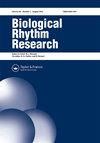睡眠不足、情绪状态和极限强度自行车运动的表现
IF 0.9
4区 生物学
Q3 BIOLOGY
引用次数: 2
摘要
摘要本研究旨在探讨一夜睡眠不足对情绪状态和运动表现的影响,以确定情绪状态和表现之间的关系。采用受试者内部重复测量设计。7名女性(21±2岁,164±9厘米,62±14公斤)参加了研究。他们完成了情绪状态调查问卷,并在一晚睡眠不足之前和之后连续三天进行了详尽的极限强度循环测力计测试(310±70 W)。平均疲劳时间不受睡眠不足的影响。与基线相比,睡眠不足后第1天和第2天的平均总情绪状态障碍升高。个体疲劳时间的变化(第1天减去基线,第2天减去基线、第3天减去基线)与情绪状态的个体变化之间存在强相关性(r>0.82):疲劳时间的改变与第1天疲劳分量表的变化相关;第2天活力分量表的变化和第3天疲劳分量表的改变。这些结果证明了情绪状态和表现之间的关系,这可能反映也可能不反映因果关系。本文章由计算机程序翻译,如有差异,请以英文原文为准。
Sleep loss, mood state, and performance of extreme intensity cycling exercise
ABSTRACT The purpose of this study was to investigate the effects of one night’s sleep loss on mood state and exercise performance, for the purpose of identifying relationships between mood state and performance. A within-subjects repeated-measures design was used. Seven women (21 ± 2 y, 164 ± 9 cm, 62 ± 14 kg) participated. They completed Profile of Mood States questionnaires and performed exhaustive extreme intensity cycle ergometer tests (310 ± 70 W) before, and on three consecutive days following, one night’s sleep loss. Mean time to exhaustion was not affected by sleep loss. Mean total mood state disturbance was elevated on days 1 and 2 after sleep loss compared to baseline. There were strong correlations (r > 0.82) between individual changes (day 1 minus baseline, day 2 minus baseline, day 3 minus baseline) in time to exhaustion and individual changes in mood state: changes in time to exhaustion were associated with changes in the fatigue subscore on day 1; with changes in the vigour subscore on day 2, and with changes in the fatigue subscore on day 3. These results demonstrate a relationship, which may or may not reflect causality, between mood state and performance.
求助全文
通过发布文献求助,成功后即可免费获取论文全文。
去求助
来源期刊

Biological Rhythm Research
生物-生理学
CiteScore
3.00
自引率
9.10%
发文量
34
审稿时长
6-12 weeks
期刊介绍:
The principal aim of Biological Rhythm Research is to cover any aspect of research into the broad topic of biological rhythms. The area covered can range from studies at the genetic or molecular level to those of behavioural or clinical topics. It can also include ultradian, circadian, infradian or annual rhythms. In this way, the Editorial Board tries to stimulate interdisciplinary rhythm research. Such an aim reflects not only the similarity of the methods used in different fields of chronobiology, but also the fact that many influences that exert controlling or masking effects are common. Amongst the controlling factors, attention is paid to the effects of climate change on living organisms. So, papers dealing with biometeorological aspects can also be submitted.
The Journal publishes original scientific research papers, review papers, short notes on research in progress, book reviews and summaries of activities, symposia and congresses of national and international organizations dealing with rhythmic phenomena.
 求助内容:
求助内容: 应助结果提醒方式:
应助结果提醒方式:


